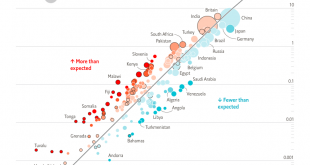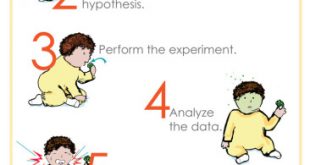MMT perspectives on rising interest rates The Bank of England is today wholly-owned by the UK government, and no other body is allowed to create UK pounds. It can create digital pounds in the payments system that it runs, thus marking up and down the accounts of banks, the government and other public institutions. It also acts as the bank of the government, facilitating its payments. The Bank of England also determines the bank rate, which is the interest...
Read More »Comment juguler la pandémie
Comment juguler la pandémie Les Etats-Unis, le Royaume-Uni et les pays européens dans leur ensemble … continuent d’être confrontés aux résurgences répétées d’une circulation virale en croissance exponentielle. Ils peuvent parvenir à juguler la pandémie en suivant l’exemple des pays qui ont réussi à le faire. Mais pour les citoyens, attendre une réponse officielle déjà trop retardée serait un jeu de dupes. N’attendez pas que vos gouvernements agissent....
Read More »Polyglot celebrity
Yours truly knows nine (and decently speaks four) languages, but this guy actually speaks seven languages. Impressive! [embedded content]
Read More »How to argue with silly economists
How to argue with silly economists In the increasingly contentious world of pop economics, you … may find yourself in an argument with an economist. And when this happens, you should be prepared, because many of the arguments that may seem at first blush to be very powerful and devastating are, in fact, pretty weak tea … Principle 1: Credentials are not an argument. Example: “You say Theory X is wrong…but don’t you know that Theory X is supported by Nobel...
Read More »IPA’s weekly links
Guest post by Jeff Mosenkis of Innovations for Poverty Action First a plug – my colleagues at IPA have done amazing work this year quickly pivoting a big research organization to tackle the covid crisis head-on, studying hunger, refugee issues, education and 80+ other topics, and staying up late into the night, over and over again. Not all of our expenses are covered directly by research grants, so we rely on donations for the rest. If you donate here BEFORE TUESDAY you gift will be...
Read More »Arrow-Debreu obsession
I’ve never yet been able to understand why the economics profession was/is so impressed by the Arrow-Debreu results. They establish that in an extremely abstract model of an economy, there exists a unique equilibrium with certain properties. The assumptions required to obtain the result make this economy utterly unlike anything in the real world. In effect, it tells us nothing at all. So why pay any attention to it? The attention, I suspect, must come from some prior...
Read More »Why economic models do not explain
Why economic models do not explain In physics, we have theories and centuries of experience and experiments that show how gravity makes bodies move. In economics, we know there is nothing equivalent. Mainstream economists necessarily have to load their theories and models with sets of auxiliary structural assumptions to get any results at all in their models. So why then do mainstream economists keep on pursuing this modelling project? Mainstream ‘as if’...
Read More »Statistics and causation — a critical review
Statistics and causation — a critical review Causal inferences can be drawn from nonexperimental data. However, no mechanical rules can be laid down for the activity. Since Hume, that is almost a truism. Instead, causal inference seems to require an enormous investment of skill, intelligence, and hard work. Many convergent lines of evidence must be developed. Natural variation needs to be identified and exploited. Data must be collected. Confounders need to...
Read More »50 years ago
Vor 50 Jahren reiste Kanzler Willy Brandt nach Warschau. Am Ehrenmal für den Aufstand im jüdischen Ghetto fiel er auf die Knie.
Read More »Kids knowing more about scientific methods than economists
Kids knowing more about scientific methods than economists Limiting model assumptions in economic science always have to be closely examined since if we are going to be able to show that the mechanisms or causes that we isolate and handle in our models are stable in the sense that they do not change when we “export” them to our “target systems”, we have to be able to show that they do not only hold under ceteris paribus conditions and a fortiori only are...
Read More » Heterodox
Heterodox








